Mastering the Art of Managing Multiple Clouds: The Top Five Multicloud Platforms That Are Revolutionizing the IT World
In the fast-paced world of IT, enterprises are quickly realizing the importance of deploying a multicloud strategy. Multicloud allows businesses to select different cloud services from various vendors, thereby distributing workloads and minimizing risk. To truly master the art of managing multiple clouds, one must first understand why it’s a game-changer in the industry. It allows for flexibility, cost-effectiveness, and leveraging the best capabilities from each platform, thereby optimizing resources and performance.
Nonetheless, the task of managing multiple clouds is not without challenges – from ensuring data governance to managing system complexity. Achieving a balance is crucial to minimize risk and manage costs effectively. That's where multicloud platforms come in, streamlining the process and ensuring maximum efficiency.
Azure Arc: Microsoft's Multicloud Answer

Microsoft's Azure Arc brings multicloud strategies to life by offering simplified management, faster app development, and consistent Azure services. The platform allows enterprises to manage resources securely across different infrastructure––be it on-premises, the edge, multi-cloud, or hybrid.
Azure Arc's managed Kubernetes clusters are also a major plus, supporting GitOps-style configuration management and workload assignment. Its data services, powered by Azure, offer unparalleled enterprise-class scale and security.